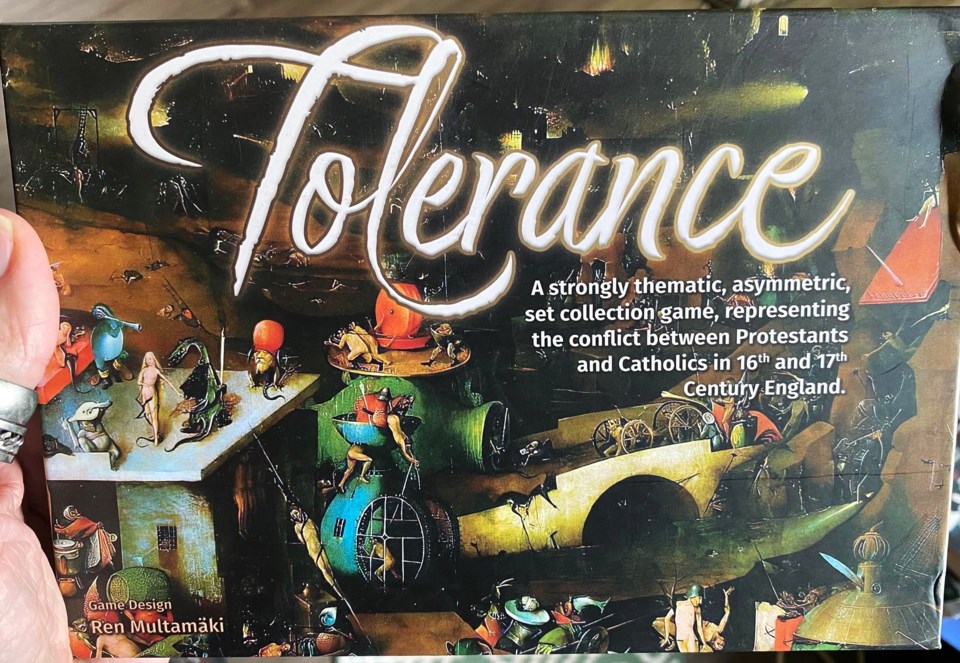YORKTON - It is amazing just how diverse board games have become. You can find a game on just about any theme you can imagine, and that means the hobby experience can be as diverse as you want it to be.
In terms of games which are significantly different – at least in terms of the usual fare of The Meeple Guild – Tolerance hit the table recently.
So out of the box Tolerance is a card game.
A first flush read of the rules suggested a game at least in the same vein as Whist – yes there are dozens of ‘trick-taking’ games – so there was some familiarity with how this one might play.
Then digging deeper, there is the rather unique theme of Tolerance.
The game is set in 16th and early 17th century Reformation England. Three to five players engage in the conflict between the Catholics and the Protestants.
The game is played over three rounds, spanning the reigns of Queen Mary, Queen Elizabeth I, and King James I, each round representing the reign of one monarch.
If that seems like a rather serious historical theme for a trick-taking game, you would be correct.
There was huge expectations here in the sense the game seemed poised to offer something quite different.
The expectation was boosted too by the art of Lars Munck, which really is a highlight of this one.
As for game play, Tolerance is an asymmetric set collection game using the aforementioned trick-taking mechanic, with the winner of each trick performing the actions on the played cards - whether or not they are beneficial!
“The game aims to highlight the suffering mankind brings upon itself because of supposedly "wrong" beliefs - a topic which was just as valid almost 500 years ago as it still is today,” noted the publisher website at www.ddpgames.com
The game lasts about 45 minutes and is for three-to-five players.
The game is designed by Tony Cotterill and Ren Multamäki.
Via email Multamäki said he is certainly a gamer himself.
“Yeah, I play as much as I can but living in a very sparsely populated area, it means
very few opportunities to play. I generally like to see new games - very few games
are worth play of more than say two-three times when you get to play on average once or twice times a week.”
So Multamäki doesn’t have ‘go-to’ games.
“Naming just one game as favourite is not ‘me’ The favourite game depends
on the group you play with and the mood you're looking for. If you look for an
easy game with group of friends on relaxed mood Stick'em is great or Tournament at Avalon.
“When you look for something more complex, Dominations’ or even age old ‘Eufrat and Tigris’ could be just the thing.
“It all depends on so many variables: time, player count, experience level and expected brain-burner level.”
So what about Tolerance? What was the idea which led to creating this game?
“I am a history connoisseur and trick-taking aficionado, so combining both elements of my hobbies felt like a natural way to go,” related. “For me creating a game is always something that comes from theme.
“This was a strong theme, with clear transition which is easily modelled into game mechanic. As the visual style was possible to do with almost entirely period art (three of the card arts are not period art, but later reproductions, feel free to try to spot those) I wanted to see if this could be done.”
Multamäki had goals in the game’s design.
“Any board game that I seem to like needs to tell some story,” he said. “Tolerance tells the story of historical transition from Catholicism to Protestantism. Players all around the world - including for instance a group of Brazilians, one of them a nun, have felt it capturing the history and still providing playable mechanic that improves when players improve. There is clearly something to learn there.”
From the designer’s perspective, What can players expect here?
“As with most asymmetric games, you can not just copy what some other player does as
your goals may not coincide,” said Multamäki. “Tolerance is light weight card game, but it requires and offers far more than your usual trick-taker. Winning a trick may mean losing points to one, gaining points to another.
So back to The Meeple Guild table, where Tolerance ultimately fell short of what we were hoping for. The need to create the tensions and battles between the two faiths in the period of the game of course dictated much in the design, but in terms of creating a ‘fun’ game experience it was just too big a history for the game to manage.
As a result the key element of the winner of each trick performing the actions on the played cards proved a bit tedious for little return in game play joy.
Diehard history buffs may get more from Tolerance, but it fell a bit short for us – even with the outstanding art.





.JPG;w=120;h=80;mode=crop)
